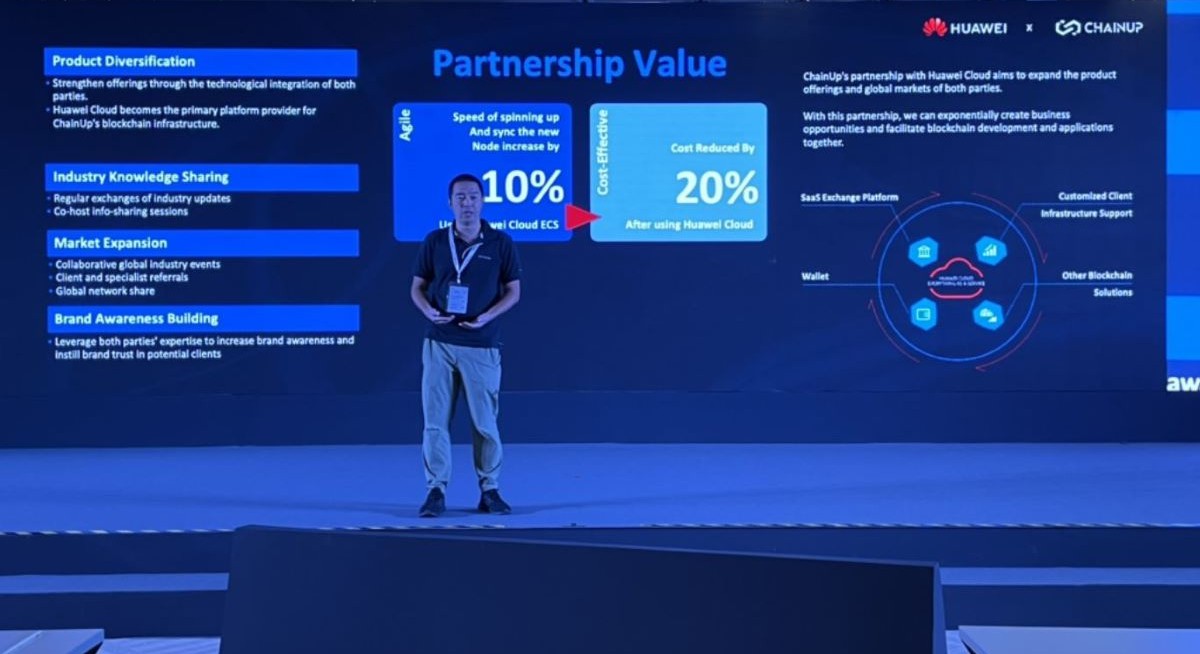“Web 3.0 is about read-write-own. The keyword here is ‘own’. Users own and control their data instead of relying on any centralised organisation, company or government, which means they have real freedom,” says Gao ZhangPeng, global head of sales at ChainUp — a Singapore-based blockchain technology solutions provider — during the Huawei Connect 2022 event in Bangkok recently.
Foundational blocks of Web 3.0
What does it take to enable the next generation of the Internet? In terms of technology, blockchain and cloud computing are critical enablers of Web 3.0.
A blockchain is a database or digital ledger that stores data in “blocks”, which are strung together in a chain. It is also built on a decentralised network, which prevents an individual computer from having power over the entire blockchain, preventing previous “blocks” from being modified.
A blockchain can provide an immutable, transparent, traceable, and secure data system. In a blockchain-based Web 3.0, users can control the data they want to share with specific platforms and get compensated for it.
However, there are challenges to using blockchains as Web 3.0 takes off. Firstly, blockchains require significant aggregate computing power, built on many nodes (or computers in the network), which validate blocks and network transactions. Secondly, they need to be able to scale up their computing power if the chain grows.
Having the proper supporting cloud infrastructure is crucial. Recognising this, ChainUp is using Huawei Cloud as the backbone of its blockchain solutions. As a result, the company has increased the speed of spinning up a blockchain node and syncing the new node to existing ones by 10% and reduced its operational cost by 20%, says Gao.
To further help businesses embrace blockchain and benefit from Web 3.0, ChainUp has partnered with Huawei Cloud to expand its product offerings and business footprint. They will also jointly promote blockchain adoption and development within the burgeoning fintech ecosystem in Singapore.
“With this partnership, we can exponentially create business opportunities and facilitate blockchain development and applications together,” says Gao.
“We will do so by strengthening our offerings through the technological integration of both parties. With Huawei Cloud as the primary platform provider of ChainUp’s blockchain infrastructure, we can help customers to save on operational costs. Additionally, ChainUp and Huawei Cloud will conduct regular industry knowledge-sharing sessions such as the Web 3.0 panel discussion at Huawei Connect 2022 in Bangkok and look at ways to help each other expand our market presence.”
Industry thought leaders and practitioners came together at the Huawei Connect 2022 in Bangkok to discuss what needs to be done to realise a safe, secure and thriving Web 3.0. Photo: Huawei
No one-size-fits-all blockchain
Although blockchain is an underlying technology of Web 3.0, there will be more than one type of blockchain supporting the decentralised Internet.
“There are many kinds of blockchain today — such as dedicated and private chains, consortium or permissioned chains within a group of members, side chains and public chains — and each has different features. Enterprises or creators will use different types of blockchains depending on the needs of their Web 3.0 apps or NFTs, so we believe there won’t be a one-size-fits-all type of blockchain for the next generation of the Internet,” asserts Nick Qu, the director of Blockchain Lab at Huawei Cloud.
Huawei Cloud has designed its Blockchain Service (BCS) to support cross-chain and cross-system authentication and interoperation. The service also offers the following:
- Ease of use, with a one-click deployment and complete lifecycle management
- Flexibility and efficiency. It can perform 100,000 transactions per second, supporting multiple efficient consensus algorithms and flexible switching, dynamic join-in or quitting of multi-role nodes and members, and container-based management.
- Robust security by providing complete management and isolation of users, keys, and permissions; multi-layer encryption and privacy assurance; and a fully demonstrated cyber security infrastructure.
- Cost-effectiveness as it offers pay-per-use convenience. Additionally, it can help lower development and deployment costs, reduce operations and maintenance expenditures with unified management, and enable auto-scaling, upgrade and rollback on demand.
Huawei Cloud’s BCS has been deployed in more than 700 use cases across various industries in China so far. BCS supports a tax data exchange platform, a supply chain finance platform and a DNA gene detection and health chain, among others.
“Besides having robust and secure blockchain services, we also need other technologies to enable Web 3.0. We are therefore offering a full stack (or tools for end-to-end app development) that includes blockchain and our other capabilities like AI, IoT and 5G. That way, we can empower organisations to build a connected, trusted, intelligent world through Web 3.0,” says Qu.
To help organisations further thrive in the Web 3.0 era, executives from Huawei shared their insights at the recent Cloud Expo Asia 2022 event in Singapore. Ivan Low, chief strategy officer of Huawei International, provided tips for “Transformation Towards a Cognitive City”, while vice president of Huawei APAC Hunter Shao shared ways to “Unleash the Power of Cloud to Accelerate APAC Digital Economy”.
Additionally, Huawei Cloud APAC’s chief technology officer Wu Shiwei spoke about “Reshaping Enterprise Digital Transformation with Cloud Native 2.0”, while industry solution architect for banking and financial services Sijukumar Kumaran touched on “Enterprise Cloud Transformation using Huawei Cloud”.
At its booth at the event, Huawei Cloud showcased its extensive offerings, including cloud-native infrastructure, Web 3.0 cloud foundation, cloud-cloud synergy, virtual human service and Spark start-up platform. It also invited partners like ChainUp to share how their solution leverages Huawei Cloud.




